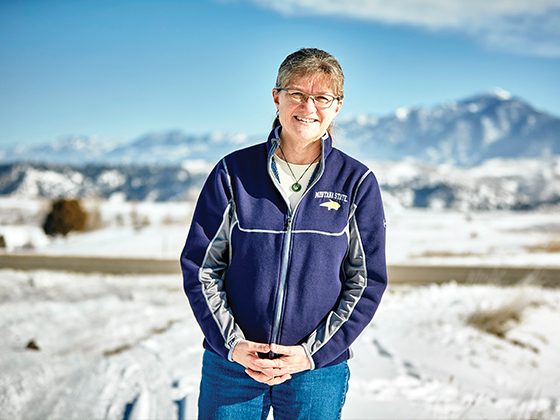BOZEMAN — An internationally recognized scholar will discuss rural education in the next installment of Montana State University’s 2023-24 Provost’s Distinguished Lecturer Series.
Jayne Downey, professor in the Department of Education in the College of Education, Health and Human Development and director of the MSU Center for Research on Rural Education, will deliver “Rural Education in a Changing World.” The lecture is free and open to the public. It will be held at 7 p.m. Tuesday, Feb. 13, in the Hager Auditorium at the Museum of the Rockies and will be followed by a reception.
Downey plans to talk about several of the important things happening in the field of rural education in Montana, as well as some extensions of that work globally. Specifically, she’ll discuss collaborative efforts throughout Montana to prepare individuals to work as teachers and counselors in rural schools and thrive in rural communities.
“Preparing teachers for rural schools and communities is really important to us here in Montana,” she said. “We’re also seeing how important it is in places around the globe.”
Another part of Downey’s talk will focus on efforts around mental health support in rural communities.
“It’s important to make the needs and the opportunities visible in terms of the mental health and well-being of rural students and community members,” Downey said. “Our work to train rural school counselors and mental health professionals is a key way to support rural schools and kids and community members and increase access to good mental health services.”
Downey came to MSU in 2002 and has dedicated her career to strengthening rural education through research, teaching and outreach. Her scholarship has focused on two main themes: supporting positive academic outcomes for students of all ages and strengthening the preparation of pre-service teachers and counselors for rural settings.
In a 2021 interview for MSU’s Mountains and Minds magazine, Downey said one of her main goals as a professor is to make sure future teachers and counselors understand the importance of rural schools and help them develop the knowledge and skills they’ll need to be successful in those communities.
“A well-prepared rural educator is ready for the classroom, as every educator needs to be, and they’re also school and community ready,” Downey said. “I want to make sure our students understand how the rural school is supported by the community and serves as an important hub for all members.
“I want to give our pre-service teachers the opportunity to develop understanding and skills that will allow them not just to make a living as a teacher, but to also build a life as a member of a rural community.”
Downey serves as lead researcher for the Montana Rural Teacher Project, a five-year, grant-funded program that provides financial support for eligible teacher candidates as they complete an intensive graduate teacher preparation program. The program then provides mentoring support during the first two years of teaching in a rural school. In recent years Downey has also secured funding for several additional projects to address rural education needs in Montana, including a grant to increase the number of rurally trained counselors and mental health professionals for Montana and another that aims to reduce the critical shortage of teachers in rural Montana, strengthen the teaching profession across the state and help ensure that Montana’s students are taught by well-prepared and supported teachers.
Downey praised her collaborators – from faculty and doctoral students at MSU to cooperating teachers, administrators and community members across Montana – for their efforts.
“On a daily basis I am grateful for the opportunity to work with an incredible team of professionals,” she said. “To a person, this team goes the extra mile to ensure that MSU students have access to opportunities to explore, to be part of a rural community and to really connect with rural kids.”
In 2021, Downey co-authored a textbook, “Teaching in Rural Places: Thriving in Classrooms, Schools, and Communities,” that is designed to encourage pre-service and early-career teachers to think critically about the impact of rurality on their work and what it means to live, teach, learn and thrive in rural communities. The textbook also celebrates the unique elements – those both challenging and rewarding – of rural teaching. Another book she co-edited, “Rural Education Across the World: Models of Innovative Practice and Impact,” was also published that year.
Among other awards, in 2022 Downey received the national Career Achievement Award from the American Educational Research Association’s Rural Education Special Interest Group.
She said her motivations for her work are two-fold. First, she views it as an important aspect of MSU’s mission.
“As a faculty member here at MSU, I have a deep commitment to bringing the land-grant mission to life,” she said. “I want to contribute to that mission in a way that is concrete and meaningful and lasting.”
In addition, Downey’s personal experiences are part of her motivation.
“My second part of my ‘why’ is because I’m a rural kid,” she said. “I grew up rural. I would finish my chores, get on the bus, and ride for an hour to get to our K-12 school.
“I know the difference that good teachers make in rural kids’ lives,” Downey continued. “I want rural kids today to have access to really well-prepared teachers so that they have as much hope for their future as I had the opportunity to have.”
Downey said she hopes that people who attend the provost’s lecture will leave with new perspectives.
“I hope that we can have a clear-eyed grasp of the challenges in front of us, but that those do not overshadow or drown out our vision for the opportunities,” she said. “I’d like there to be a clear sense of how the challenges can spark and inspire innovation and opportunities for us here in Montana and also with colleagues and partners around the world.”

